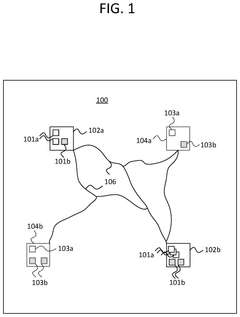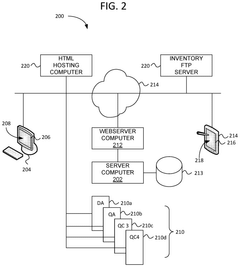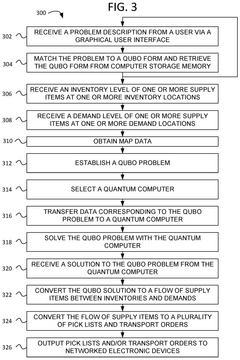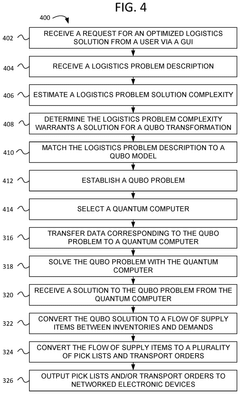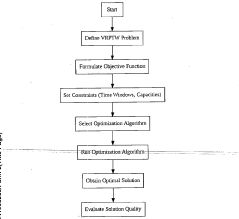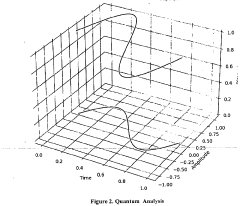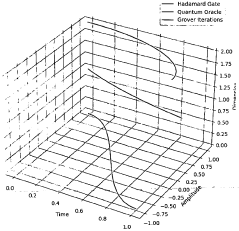Quantum Computing in Reshaping Transportation Logistic Strategies
JUL 17, 20259 MIN READ
Generate Your Research Report Instantly with AI Agent
Patsnap Eureka helps you evaluate technical feasibility & market potential.
Quantum Computing Evolution and Transportation Goals
Quantum computing has emerged as a revolutionary technology with the potential to transform various industries, including transportation and logistics. The evolution of quantum computing in reshaping transportation strategies can be traced back to the early 2000s when theoretical concepts began to materialize into practical applications. As quantum systems progressed from a few qubits to more complex arrangements, researchers and industry leaders started exploring their potential in optimizing transportation networks and logistics operations.
The primary goal of integrating quantum computing into transportation logistics is to enhance efficiency, reduce costs, and minimize environmental impact. By leveraging the unique properties of quantum systems, such as superposition and entanglement, transportation planners aim to solve complex optimization problems that are currently intractable for classical computers. These include route optimization, fleet management, and supply chain coordination on a global scale.
One of the key milestones in this journey was the development of quantum annealing systems, which showed promise in solving combinatorial optimization problems relevant to transportation. Companies like D-Wave Systems pioneered this technology, leading to early experiments in traffic flow optimization and vehicle routing. As gate-based quantum computers advanced, new algorithms emerged that could potentially revolutionize logistics planning, such as the quantum approximate optimization algorithm (QAOA) and variational quantum eigensolver (VQE).
The transportation industry's objectives for quantum computing applications have evolved alongside technological advancements. Initially, the focus was on proof-of-concept demonstrations, showing that quantum algorithms could outperform classical methods in specific, constrained scenarios. As quantum hardware improved, goals shifted towards practical implementations that could handle real-world complexities, such as dynamic traffic conditions, multimodal transportation networks, and global supply chain management.
Recent years have seen a convergence of quantum computing with other emerging technologies like artificial intelligence and the Internet of Things. This integration aims to create intelligent transportation systems that can adapt in real-time to changing conditions, predict and mitigate disruptions, and optimize resource allocation across vast networks. The ultimate vision is to achieve a seamless, efficient, and sustainable global transportation ecosystem powered by quantum-enhanced decision-making processes.
As we look towards the future, the goals for quantum computing in transportation logistics continue to expand. Researchers and industry leaders are now exploring how quantum sensors could enhance the precision of GPS systems, how quantum communication could secure logistics data, and how quantum machine learning could revolutionize demand forecasting and inventory management. The ongoing challenge is to bridge the gap between theoretical quantum advantages and practical, scalable solutions that can be deployed in real-world transportation scenarios.
The primary goal of integrating quantum computing into transportation logistics is to enhance efficiency, reduce costs, and minimize environmental impact. By leveraging the unique properties of quantum systems, such as superposition and entanglement, transportation planners aim to solve complex optimization problems that are currently intractable for classical computers. These include route optimization, fleet management, and supply chain coordination on a global scale.
One of the key milestones in this journey was the development of quantum annealing systems, which showed promise in solving combinatorial optimization problems relevant to transportation. Companies like D-Wave Systems pioneered this technology, leading to early experiments in traffic flow optimization and vehicle routing. As gate-based quantum computers advanced, new algorithms emerged that could potentially revolutionize logistics planning, such as the quantum approximate optimization algorithm (QAOA) and variational quantum eigensolver (VQE).
The transportation industry's objectives for quantum computing applications have evolved alongside technological advancements. Initially, the focus was on proof-of-concept demonstrations, showing that quantum algorithms could outperform classical methods in specific, constrained scenarios. As quantum hardware improved, goals shifted towards practical implementations that could handle real-world complexities, such as dynamic traffic conditions, multimodal transportation networks, and global supply chain management.
Recent years have seen a convergence of quantum computing with other emerging technologies like artificial intelligence and the Internet of Things. This integration aims to create intelligent transportation systems that can adapt in real-time to changing conditions, predict and mitigate disruptions, and optimize resource allocation across vast networks. The ultimate vision is to achieve a seamless, efficient, and sustainable global transportation ecosystem powered by quantum-enhanced decision-making processes.
As we look towards the future, the goals for quantum computing in transportation logistics continue to expand. Researchers and industry leaders are now exploring how quantum sensors could enhance the precision of GPS systems, how quantum communication could secure logistics data, and how quantum machine learning could revolutionize demand forecasting and inventory management. The ongoing challenge is to bridge the gap between theoretical quantum advantages and practical, scalable solutions that can be deployed in real-world transportation scenarios.
Market Demand for Quantum-Enhanced Logistics
The market demand for quantum-enhanced logistics is rapidly growing as transportation and supply chain industries seek innovative solutions to optimize their operations. This surge in interest is driven by the potential of quantum computing to revolutionize complex problem-solving in logistics, offering unprecedented efficiency and cost savings.
One of the primary drivers of market demand is the increasing complexity of global supply chains. As businesses expand their operations across borders and continents, the need for more sophisticated logistics management tools becomes paramount. Quantum computing promises to address this challenge by providing superior optimization capabilities for route planning, inventory management, and demand forecasting.
The e-commerce boom has also significantly contributed to the demand for quantum-enhanced logistics solutions. With the exponential growth of online shopping, companies are under pressure to deliver goods faster and more efficiently. Quantum algorithms could potentially optimize last-mile delivery routes, reducing fuel consumption and delivery times, thus meeting the ever-increasing consumer expectations for rapid order fulfillment.
Another factor driving market demand is the push for sustainability in transportation. As governments and corporations set ambitious carbon reduction targets, there is a growing need for tools that can minimize the environmental impact of logistics operations. Quantum computing's ability to solve complex optimization problems could lead to more efficient use of resources, reduced emissions, and overall greener supply chains.
The financial sector's interest in quantum-enhanced logistics is also noteworthy. Investment firms and venture capitalists are increasingly recognizing the potential of quantum technologies in transforming transportation strategies. This has led to a surge in funding for startups and research initiatives focused on developing quantum solutions for logistics challenges.
Moreover, the defense and aerospace industries are showing keen interest in quantum-enhanced logistics. The ability to optimize military supply chains and improve the efficiency of aircraft routing and maintenance schedules presents significant strategic advantages, driving investment and research in this area.
However, it's important to note that the market for quantum-enhanced logistics is still in its early stages. While the potential is immense, practical applications are currently limited due to the nascent state of quantum hardware. This creates a unique market dynamic where demand is driven by future potential rather than immediate applicability, leading to significant investment in research and development.
As quantum technologies continue to advance, it is expected that the market demand for quantum-enhanced logistics solutions will grow exponentially. Industry analysts predict that as quantum computers become more powerful and accessible, their integration into logistics and supply chain management will become increasingly commonplace, reshaping the entire transportation industry landscape.
One of the primary drivers of market demand is the increasing complexity of global supply chains. As businesses expand their operations across borders and continents, the need for more sophisticated logistics management tools becomes paramount. Quantum computing promises to address this challenge by providing superior optimization capabilities for route planning, inventory management, and demand forecasting.
The e-commerce boom has also significantly contributed to the demand for quantum-enhanced logistics solutions. With the exponential growth of online shopping, companies are under pressure to deliver goods faster and more efficiently. Quantum algorithms could potentially optimize last-mile delivery routes, reducing fuel consumption and delivery times, thus meeting the ever-increasing consumer expectations for rapid order fulfillment.
Another factor driving market demand is the push for sustainability in transportation. As governments and corporations set ambitious carbon reduction targets, there is a growing need for tools that can minimize the environmental impact of logistics operations. Quantum computing's ability to solve complex optimization problems could lead to more efficient use of resources, reduced emissions, and overall greener supply chains.
The financial sector's interest in quantum-enhanced logistics is also noteworthy. Investment firms and venture capitalists are increasingly recognizing the potential of quantum technologies in transforming transportation strategies. This has led to a surge in funding for startups and research initiatives focused on developing quantum solutions for logistics challenges.
Moreover, the defense and aerospace industries are showing keen interest in quantum-enhanced logistics. The ability to optimize military supply chains and improve the efficiency of aircraft routing and maintenance schedules presents significant strategic advantages, driving investment and research in this area.
However, it's important to note that the market for quantum-enhanced logistics is still in its early stages. While the potential is immense, practical applications are currently limited due to the nascent state of quantum hardware. This creates a unique market dynamic where demand is driven by future potential rather than immediate applicability, leading to significant investment in research and development.
As quantum technologies continue to advance, it is expected that the market demand for quantum-enhanced logistics solutions will grow exponentially. Industry analysts predict that as quantum computers become more powerful and accessible, their integration into logistics and supply chain management will become increasingly commonplace, reshaping the entire transportation industry landscape.
Quantum Computing Challenges in Transportation
Quantum computing presents significant challenges when applied to transportation logistics strategies. The complexity of quantum systems and their inherent instability pose substantial obstacles to practical implementation. One of the primary challenges is maintaining quantum coherence, which is crucial for quantum computations. In transportation scenarios, where environmental factors are diverse and often unpredictable, preserving quantum states becomes even more challenging.
The scalability of quantum systems is another major hurdle. While small-scale quantum computers have shown promise in laboratory settings, scaling them up to handle the vast and complex networks typical in transportation logistics remains a formidable task. This scalability issue is compounded by the need for error correction, which becomes exponentially more difficult as the number of qubits increases.
Integration with existing classical computing infrastructure is a significant challenge. Transportation systems rely heavily on established technologies and protocols. Bridging the gap between quantum and classical systems requires developing new interfaces and protocols, which is a complex and time-consuming process. This integration challenge extends to software development, where creating quantum algorithms that can effectively address transportation problems is still in its infancy.
The cost factor cannot be overlooked. Quantum computers are extremely expensive to build and maintain, requiring specialized equipment and highly skilled personnel. For many transportation companies, the investment required for quantum computing may be prohibitively high, especially when the return on investment is not yet clear.
Data security is another critical concern. While quantum computing offers the potential for enhanced encryption, it also poses a threat to current encryption methods used in transportation logistics. This dual nature of quantum computing in security creates a complex landscape that needs careful navigation.
The lack of standardization in quantum computing technologies presents another challenge. Different approaches to quantum computing, such as superconducting qubits, trapped ions, and topological qubits, are being developed simultaneously. This diversity, while beneficial for innovation, complicates the process of selecting and implementing quantum solutions in transportation logistics.
Lastly, there is a significant skills gap in the industry. The field of quantum computing requires expertise that combines advanced physics, computer science, and domain-specific knowledge in transportation logistics. Finding and training professionals who can effectively bridge these areas is a substantial challenge for the transportation sector.
The scalability of quantum systems is another major hurdle. While small-scale quantum computers have shown promise in laboratory settings, scaling them up to handle the vast and complex networks typical in transportation logistics remains a formidable task. This scalability issue is compounded by the need for error correction, which becomes exponentially more difficult as the number of qubits increases.
Integration with existing classical computing infrastructure is a significant challenge. Transportation systems rely heavily on established technologies and protocols. Bridging the gap between quantum and classical systems requires developing new interfaces and protocols, which is a complex and time-consuming process. This integration challenge extends to software development, where creating quantum algorithms that can effectively address transportation problems is still in its infancy.
The cost factor cannot be overlooked. Quantum computers are extremely expensive to build and maintain, requiring specialized equipment and highly skilled personnel. For many transportation companies, the investment required for quantum computing may be prohibitively high, especially when the return on investment is not yet clear.
Data security is another critical concern. While quantum computing offers the potential for enhanced encryption, it also poses a threat to current encryption methods used in transportation logistics. This dual nature of quantum computing in security creates a complex landscape that needs careful navigation.
The lack of standardization in quantum computing technologies presents another challenge. Different approaches to quantum computing, such as superconducting qubits, trapped ions, and topological qubits, are being developed simultaneously. This diversity, while beneficial for innovation, complicates the process of selecting and implementing quantum solutions in transportation logistics.
Lastly, there is a significant skills gap in the industry. The field of quantum computing requires expertise that combines advanced physics, computer science, and domain-specific knowledge in transportation logistics. Finding and training professionals who can effectively bridge these areas is a substantial challenge for the transportation sector.
Current Quantum Approaches in Transportation
01 Quantum Circuit Design and Optimization
This area focuses on developing and optimizing quantum circuits for various applications. It involves creating efficient quantum gate sequences, reducing circuit depth, and improving overall performance of quantum algorithms. Techniques may include circuit compression, gate decomposition, and noise mitigation strategies to enhance the reliability of quantum computations.- Quantum computing architectures: This category focuses on the design and implementation of quantum computing systems. It includes innovations in qubit arrangements, circuit layouts, and overall system architectures to improve quantum computation efficiency and scalability.
- Error correction and fault tolerance: This area addresses the challenges of maintaining quantum coherence and mitigating errors in quantum systems. It involves techniques for error detection, correction, and fault-tolerant quantum computation to improve the reliability and stability of quantum computers.
- Quantum algorithms and applications: This category encompasses the development of quantum algorithms for various computational problems and their practical applications. It includes innovations in quantum simulation, optimization, machine learning, and cryptography, leveraging the unique properties of quantum systems.
- Quantum-classical hybrid systems: This area focuses on integrating quantum and classical computing technologies. It includes methods for interfacing quantum and classical systems, optimizing resource allocation, and developing hybrid algorithms that leverage the strengths of both paradigms.
- Quantum hardware and control systems: This category covers advancements in quantum hardware components and control systems. It includes innovations in qubit technologies, quantum gates, readout mechanisms, and precise control systems for manipulating quantum states and performing quantum operations.
02 Error Correction and Fault Tolerance
Error correction and fault tolerance are crucial for building reliable quantum computers. This field involves developing techniques to detect and correct quantum errors, as well as designing fault-tolerant quantum architectures. Methods may include surface codes, topological quantum computing, and other quantum error correction protocols to improve the stability and scalability of quantum systems.Expand Specific Solutions03 Quantum-Classical Hybrid Algorithms
Hybrid algorithms combine classical and quantum computing techniques to solve complex problems. This approach leverages the strengths of both classical and quantum systems, allowing for more efficient problem-solving in areas such as optimization, machine learning, and chemistry simulations. Variational quantum algorithms and quantum-inspired classical algorithms are examples of this hybrid approach.Expand Specific Solutions04 Quantum Hardware Architectures
This area focuses on the design and development of quantum hardware architectures. It includes research into various qubit technologies such as superconducting qubits, trapped ions, and topological qubits. The goal is to create scalable and stable quantum processors with improved coherence times and gate fidelities, enabling more complex quantum computations.Expand Specific Solutions05 Quantum Software and Programming Languages
Quantum software and programming languages are essential for developing and running quantum algorithms. This field involves creating high-level quantum programming languages, compilers, and software development kits (SDKs) that allow researchers and developers to write, test, and optimize quantum programs. It also includes the development of quantum simulators and emulators for testing quantum algorithms on classical hardware.Expand Specific Solutions
Key Players in Quantum Logistics Solutions
The quantum computing landscape in reshaping transportation logistics strategies is in its early developmental stage, with a growing market potential and increasing technological maturity. Major players like IBM, Google, and Origin Quantum are driving innovation, while traditional tech giants such as Microsoft and Intel are also investing heavily. The market size is projected to expand significantly in the coming years, as quantum computing promises to revolutionize optimization problems in logistics. Companies like Accenture and Deutsche Telekom are exploring practical applications, while startups like Entanglement Inc. are focusing on specialized quantum solutions for the transportation sector. As the technology matures, we can expect more industry-specific applications and collaborations between quantum computing providers and logistics companies.
Origin Quantum Computing Technology (Hefei) Co., Ltd.
Technical Solution: Origin Quantum, a leading Chinese quantum computing company, is developing quantum technologies with potential applications in transportation logistics. Their focus is on building superconducting quantum processors and quantum software platforms. For logistics, Origin Quantum is exploring quantum algorithms for solving complex optimization problems such as vehicle routing, warehouse layout design, and supply chain management[15]. They are working on quantum annealing and gate-based approaches to address these challenges. Origin Quantum's research includes developing quantum-inspired algorithms that can run on classical hardware, providing immediate benefits to logistics companies while full-scale quantum computers are being perfected. They are also collaborating with Chinese logistics firms to identify specific industry problems that quantum computing could address, such as optimizing intermodal transportation networks and reducing empty miles in trucking operations[16].
Strengths: Strong government support, rapidly advancing quantum hardware capabilities, and focus on practical industry applications. Weaknesses: International collaboration may be limited due to geopolitical factors, and quantum advantage not yet demonstrated in real-world logistics scenarios.
Google LLC
Technical Solution: Google's approach to quantum computing in transportation logistics leverages its Sycamore quantum processor and TensorFlow Quantum framework. They are developing quantum algorithms for route optimization and traffic flow prediction, potentially revolutionizing urban transportation systems[5]. Google's quantum supremacy experiment demonstrated the ability to perform calculations in 200 seconds that would take classical supercomputers 10,000 years, indicating the potential for solving complex logistics problems[6]. Their research focuses on quantum approximate optimization algorithms (QAOA) for tackling combinatorial optimization problems in logistics, such as vehicle routing and warehouse management[7]. Google is also exploring quantum machine learning techniques to enhance demand forecasting and inventory management in supply chains[8].
Strengths: Advanced quantum hardware, strong AI and machine learning capabilities, and vast data resources for algorithm development. Weaknesses: Quantum error correction still a challenge, and practical applications in logistics are still in early stages.
Breakthrough Quantum Algorithms for Logistics
Method and apparatus for logistics management using quantum computing
PatentActiveUS20240394653A1
Innovation
- A computer method utilizing a quantum or quantum-inspired computer to solve logistics optimization problems by transforming them into Quadratic Unconstrained Binary Optimization (QUBO) problems, which are then solved to generate optimal supply item flows and delivery routes, enabling dynamic adjustments based on real-time data.
Quantum parallelism for real-time route optimization in supply chains
PatentPendingIN202441008263A
Innovation
- A quantum computing algorithm utilizing superposition, quantum gates like the Grover diffusion operator and Hadamard gate, and a quantum oracle to encode VRPTW, enabling simultaneous exploration of multiple solutions and amplifying viable routes, thereby overcoming scalability problems and improving computational efficiency.
Quantum Computing Infrastructure Requirements
Quantum computing infrastructure requirements for reshaping transportation logistics strategies are complex and multifaceted. The foundation of this infrastructure lies in the development and deployment of quantum computers capable of solving complex optimization problems at scales far beyond classical computers. These systems require specialized hardware, including superconducting circuits or trapped ions, maintained at ultra-low temperatures to preserve quantum states.
A critical component of the quantum infrastructure is the quantum processor, which must be able to maintain coherence for extended periods to perform the necessary calculations. This demands advanced error correction techniques and fault-tolerant quantum circuits. Alongside the quantum processor, classical control systems are essential for managing quantum operations and interfacing with traditional computing systems.
The quantum-classical hybrid approach is crucial for transportation logistics applications. This necessitates the development of quantum-classical algorithms and software frameworks that can effectively leverage the strengths of both quantum and classical computing paradigms. These hybrid systems must be capable of translating complex logistics problems into quantum algorithms and interpreting the results for practical use.
Quantum networking infrastructure is another vital element, enabling secure communication and distributed quantum computing. This includes quantum repeaters and quantum memory devices to extend the range of quantum information transfer, which is essential for coordinating logistics operations across vast geographical areas.
Data centers equipped to house and maintain quantum computers are a significant infrastructural requirement. These facilities must provide the necessary cooling systems, shielding from electromagnetic interference, and stable power supplies to ensure optimal quantum computer performance.
Lastly, the human infrastructure cannot be overlooked. A workforce skilled in quantum computing, including quantum algorithm developers, hardware engineers, and quantum software specialists, is essential. This requires investment in education and training programs to build a pool of talent capable of developing and maintaining quantum systems for transportation logistics applications.
A critical component of the quantum infrastructure is the quantum processor, which must be able to maintain coherence for extended periods to perform the necessary calculations. This demands advanced error correction techniques and fault-tolerant quantum circuits. Alongside the quantum processor, classical control systems are essential for managing quantum operations and interfacing with traditional computing systems.
The quantum-classical hybrid approach is crucial for transportation logistics applications. This necessitates the development of quantum-classical algorithms and software frameworks that can effectively leverage the strengths of both quantum and classical computing paradigms. These hybrid systems must be capable of translating complex logistics problems into quantum algorithms and interpreting the results for practical use.
Quantum networking infrastructure is another vital element, enabling secure communication and distributed quantum computing. This includes quantum repeaters and quantum memory devices to extend the range of quantum information transfer, which is essential for coordinating logistics operations across vast geographical areas.
Data centers equipped to house and maintain quantum computers are a significant infrastructural requirement. These facilities must provide the necessary cooling systems, shielding from electromagnetic interference, and stable power supplies to ensure optimal quantum computer performance.
Lastly, the human infrastructure cannot be overlooked. A workforce skilled in quantum computing, including quantum algorithm developers, hardware engineers, and quantum software specialists, is essential. This requires investment in education and training programs to build a pool of talent capable of developing and maintaining quantum systems for transportation logistics applications.
Ethical Implications of Quantum Logistics Optimization
The integration of quantum computing in transportation logistics optimization raises significant ethical considerations that must be carefully addressed. As quantum algorithms enhance the efficiency of supply chains and route planning, they also have the potential to disrupt existing labor markets and exacerbate economic inequalities.
One primary concern is the potential displacement of workers in the logistics sector. Quantum-optimized systems may render certain roles obsolete, particularly those involving manual route planning or inventory management. This shift could lead to job losses and economic hardship for affected individuals and communities. Policymakers and industry leaders must proactively develop strategies to retrain and redeploy workers, ensuring a just transition to quantum-enhanced logistics.
Privacy and data security present another critical ethical challenge. Quantum computing's ability to process vast amounts of data could enable more intrusive tracking of goods and vehicles. This raises questions about the extent of surveillance in supply chains and the potential for misuse of sensitive information. Striking a balance between operational efficiency and individual privacy rights will be crucial in the development of quantum logistics systems.
The environmental impact of quantum-optimized logistics also warrants ethical scrutiny. While improved route planning and resource allocation may reduce overall emissions, the energy requirements of quantum computers themselves must be considered. Ensuring that the environmental benefits of optimized logistics outweigh the energy costs of quantum computing is essential for sustainable implementation.
Fairness and equity in the distribution of benefits from quantum logistics optimization are additional ethical concerns. Large corporations with access to quantum computing resources may gain significant competitive advantages, potentially marginalizing smaller businesses unable to afford such technologies. This could lead to market consolidation and reduced competition, ultimately affecting consumer choice and pricing.
Transparency and accountability in quantum-powered decision-making processes are crucial ethical considerations. The complexity of quantum algorithms may create a "black box" effect, making it difficult for stakeholders to understand and challenge logistics decisions. Developing explainable AI systems that work in conjunction with quantum computing will be essential for maintaining trust and ensuring fair practices in the industry.
Lastly, the global implications of quantum logistics optimization raise ethical questions about international trade and economic power dynamics. Nations with advanced quantum computing capabilities may gain significant advantages in global supply chains, potentially exacerbating existing economic disparities between countries. Addressing these concerns will require international cooperation and the development of equitable frameworks for the deployment of quantum technologies in logistics.
One primary concern is the potential displacement of workers in the logistics sector. Quantum-optimized systems may render certain roles obsolete, particularly those involving manual route planning or inventory management. This shift could lead to job losses and economic hardship for affected individuals and communities. Policymakers and industry leaders must proactively develop strategies to retrain and redeploy workers, ensuring a just transition to quantum-enhanced logistics.
Privacy and data security present another critical ethical challenge. Quantum computing's ability to process vast amounts of data could enable more intrusive tracking of goods and vehicles. This raises questions about the extent of surveillance in supply chains and the potential for misuse of sensitive information. Striking a balance between operational efficiency and individual privacy rights will be crucial in the development of quantum logistics systems.
The environmental impact of quantum-optimized logistics also warrants ethical scrutiny. While improved route planning and resource allocation may reduce overall emissions, the energy requirements of quantum computers themselves must be considered. Ensuring that the environmental benefits of optimized logistics outweigh the energy costs of quantum computing is essential for sustainable implementation.
Fairness and equity in the distribution of benefits from quantum logistics optimization are additional ethical concerns. Large corporations with access to quantum computing resources may gain significant competitive advantages, potentially marginalizing smaller businesses unable to afford such technologies. This could lead to market consolidation and reduced competition, ultimately affecting consumer choice and pricing.
Transparency and accountability in quantum-powered decision-making processes are crucial ethical considerations. The complexity of quantum algorithms may create a "black box" effect, making it difficult for stakeholders to understand and challenge logistics decisions. Developing explainable AI systems that work in conjunction with quantum computing will be essential for maintaining trust and ensuring fair practices in the industry.
Lastly, the global implications of quantum logistics optimization raise ethical questions about international trade and economic power dynamics. Nations with advanced quantum computing capabilities may gain significant advantages in global supply chains, potentially exacerbating existing economic disparities between countries. Addressing these concerns will require international cooperation and the development of equitable frameworks for the deployment of quantum technologies in logistics.
Unlock deeper insights with Patsnap Eureka Quick Research — get a full tech report to explore trends and direct your research. Try now!
Generate Your Research Report Instantly with AI Agent
Supercharge your innovation with Patsnap Eureka AI Agent Platform!
